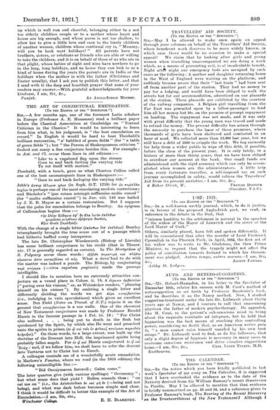THE ART OF CONJECTURAL EMENDATION. (To THE EDITOR OF THE
" SPECTATOR."] SIR,—A few months ago, one of the foremost Latin scholars in Europe (Professor A. E. Housman) read a brilliant paper before the Classical Association at Cambridge on " Textual Criticism in the Classics." It would bo interesting to learn from him what, in his judgment, is " the best emendation on record." In English it would be hard to beat Theobald's brilliant restoration, " a' babbled of green fields " (for " a table of green fields ") ; but " the Person of Shakespearean criticism " flashed out many a fine conjecture besides this. For example : in Ant. and Cl. occur these lines in old editions :-
"Like to a vagabond flag upon the stream Goes to and back lacking the varying tide To rot itself with motion."
I'heobald, with a touch, gave us what Churton Collins called one of the best onomatopoeic lines in Shakespeare :- "Goes to and back lackeying the varying tide."
Jebb's aicrrep /cacao, xicov (in Soph. O.T. 1219) for eet replaAXa Icsx/wv is perhaps one of the most convincing modern corrections ; and Bachelor's " ipso rotam astringit suffiamine mulio consul" (for " multo suffiamine consul ") in Juv. viii. 148 was hailed by J. E. B. Mayor as a certain restoration. But I suppose that the palm for emendation belongs to Bentley. An epigram of Callime,chus begins thus :— r)jv clXlev &Mean 10' is /Ma Xtrom &Wow xewaraf lieydAous ezitfrvyev &avian',
(NIKE eeols lajuSepatt.
With the change of a single letter (eirIaBcow for iriXOtoy) Bentley triumphantly brought the true sense out of a passage which had hitherto baffled every interpreter.
The late Dr. Christopher Wordsworth (Bishop of Lincoln) has some brilliant conjectures to his credit (that in Therm.. xiv. 17 is generally regarded as certain). In The Martyrdom of S. Potycarp occur these words : dEijX0e recite-rya ,cal rXiitios al'Ataaror &ere karcurfiloat rl Trip. What a dove'had to do with the matter was indeed a puzzle. The Bishop, by conjecturing rep] 0r6paica (=circa caindum pugionis) made the passage intelligible.
I should like to mention here an extremely attractive con- jecture on a vexed place in Coloss. ii. 18, a apcurev Wareemov ("poring over his visions," or, as Weizsacker renders, " pluming himself on his visions "). By omitting a single letter and differently dividing the words we get iiipa reveispareticov (i.e., indulging in vain speculations) which gives an excellent sense. But Field (Notes on Transl. of N.T.) rejects it on the ground that eeveapardery is a vox nulls. One of the cleverest of New Testament conjectures was made by Professor Rendel Harris in the famous passage in 1 Pet. iii. 19 : " For Christ also suffered . . . being put to death in the flesh but quickened by the Spirit, by which also He went and preached unto the spirits in prison (iv Kat Toil AftiC(" 7MI1IAU.01 Topetheis Exhptier)." On these words, to a large extent, was built up the doctrine of the Descent into Hell, the imprisoned spirits being probably fallen angels. For iv is; xal Harris conjectured lv yi eat 'Evdrx: and, if we follow him, we shall have to refer the descent into Tartarus not to Christ but to Enoch.
A colleague reminds me of a wonderfully acute emendation in Marlowe's Faustus, where we read (in the 1004 edition) the
following unintelligible line :— " Bid Oncaymaeon farewell ; Galen come."
The later quartos give (with various spellings) " Oeconomy " ; but what sense does that yield? Bullen emends thus : " on cai me on " (i.e., the Aristotelian av eel jai 6v (= being and not being), and what was dark before becomes simple and clear. I think it would be difficult to better this example of the Art of Emendation.—I am, Sir, etc.,


































 Previous page
Previous page